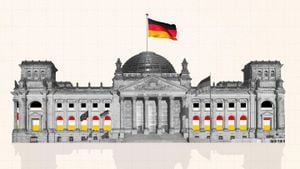NATIONAL HARBOR, United States: The US Vice President JD Vance claimed on Thursday at a conservative conference near Washington, D.C., Europe is on the "cusp of peace," attributing this potential tranquility to former President Donald Trump’s initiatives aimed at resolving Russia's war against Ukraine. Vance emphasized the need for strong diplomatic leadership to steer these discussions, saying, "It’s going to take a smart statesman to figure this stuff out." He noted optimism rooted in Trump's new approach since his return to the White House just one month ago.
Vance reiterated, "We’re on the cusp of peace in Europe for the first time in three years, because we have leadership from the Oval Office." This statement follows growing reports of tensions as the Trump administration has opened direct dialogue with Moscow, prompting worries among Kyiv and its European allies about being sidelined. Vance insisted on the necessity of these talks, stating, "How are you going to end the war without engaging with Russia?" He highlighted Trump's desire to achieve peace, stating, "He wants the killing to stop. He wants to bring lasting peace to Europe."
Experts note, this focus on negotiations has sparked anxiety within Europe, especially as Ukraine was not included in recent talks held in Riyadh between the United States and Russia. Commenting on this dynamic, security expert Muhammad Ali warned, "Europe is on its own now," which raised alarms over support and strategy.
Meanwhile, relations between Trump and Ukrainian President Volodymyr Zelensky have become increasingly strained. Following discussions about accessing Ukraine’s rare minerals for US aid— which Zelensky rejected—Trump criticized the Ukrainian leader as a "dictator." The two have publicly exchanged harsh words, driving a wedge between allies who once seemingly shared mutual interests.
On another front, Trump’s administration has made headlines with sweeping changes concerning foreign investments, particularly from China. Recently, he signed a memo aiming to tighten restrictions on Chinese investments across strategic sectors, including technology and infrastructure. The White House stated this is part of Trump's promise to protect US national interests amid surging competition with China, framing the effort as necessary to prevent foreign adversaries from utilizing American capital to bolster their military and intelligence capabilities.
The memorandum called for the Committee on Foreign Investment in the United States (CFIUS) to enact measures against Chinese investments deemed threatening to national security. CFIUS has already played a significant role, overseeing a sharp decline from $46 billion of annual Chinese investments in the US to under $5 billion in 2022, according to the Rhodium Group.
Reflecting on the new regulations, a White House official remarked on the growing scrutiny with regards to US outbound investments to China, particularly concerning cutting-edge technologies such as artificial intelligence and semiconductors. This shift continues to escalate economic tensions, compounded by Trump’s recent decision to increase tariffs on all Chinese imports.
While the White House remains firm on slashing external vulnerabilities, questions loom over the potential for future collaboration. Trump himself indicated the possibility of revisiting trade discussions with China, stating during these announcements, "A trade deal with China is possible." This development follows sustained apprehension around Chinese ownership of agricultural land, reportedly totaling around 43 million acres nationwide, with Chinese entities owning 350,000 acres across 27 states.
Vance also addressed other issues at the CPAC event, particularly concerning free speech within Europe. He criticized German laws surrounding hate speech, expressing concern about how they could affect American military personnel stationed there. He provocatively asked his audience, "Do you think the American taxpayer is going to stand for it, if you can end up jailed for posting a mean tweet?" His remarks insinuated deep dissatisfaction with German military policies and suggested reform needs on both sides of the Atlantic to strengthen this longstanding alliance.
Vance asserted, "Germany’s entire defense is subsidized by the American taxpayer," alluding to the more than 80,000 American troops currently stationed on European soil, particularly at Germany’s Ramstein Air Base. His comments drew criticism from German officials, including government spokesman Steffen Hebestreit, who expressed hope for interactions based on reason and facts rather than rhetoric. His hope is for audiences to get accurate accounts through credible media outlets.
Through these intertwined narratives—Trump’s diplomatic overtures and economic hardline against foreign investment—it is evident the administration continues to reshape the United States' role on the world stage. By balancing heavy accusations against allies alongside direct negotiations with rivals, Trump maintains his hardline stance even as he strives for peace. The coming months will likely reveal the broader implications of these policies for both international relationships and domestic dynamics.



